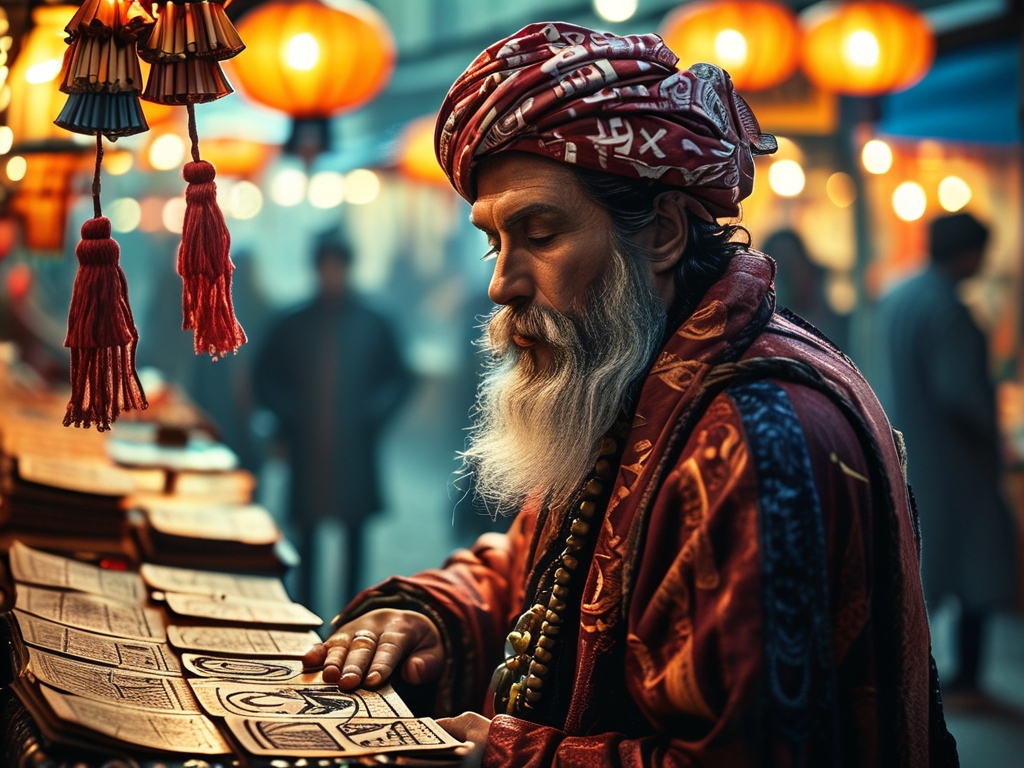Is Street Fortune Telling by Masters Real? Exploring the Intersection of Tradition and Skepticism
The sight of a street fortune teller—often seated at a makeshift table adorned with tarot cards, crystal balls, or ancient Chinese divination tools like the I Ching—has fascinated and puzzled urban dwellers for centuries. Whether in bustling Asian night markets or European cobblestone alleys, these self-proclaimed "masters" claim to unveil the mysteries of love, career, and destiny. But the question lingers: Is street fortune telling real, or is it merely a performance blending psychology, tradition, and opportunism?
The Historical Roots of Divination
Fortune telling is deeply rooted in human history. From the oracle bones of ancient China to the Delphi oracles of Greece, civilizations have long sought guidance from perceived supernatural forces. Street fortune telling, as a modern iteration, inherits this legacy. In many cultures, these practitioners are viewed as custodians of ancestral wisdom. For instance, the Chinese practice of bazi () or "Four Pillars of Destiny" uses birth dates to map life trajectories, while palmistry in India ties hand lines to karmic cycles. Such methods often rely on intricate systems passed down through generations, lending an air of authenticity to their claims.
The Psychology of Belief
Skeptics argue that street fortune telling thrives on cold reading and the Barnum effect—psychological techniques that create the illusion of personalized insight. Cold reading involves making vague, high-probability statements ("You’ve faced recent setbacks") that listeners interpret as specific truths. The Barnum effect, named after showman P.T. Barnum, explains why people relate to generalized descriptions ("You value loyalty but sometimes struggle with trust"). A 2013 study in the Journal of Cognitive Psychology found that 73% of participants accepted generic personality assessments as uniquely accurate, highlighting how easily humans project meaning into ambiguity.
Street masters also exploit emotional vulnerability. A person seeking answers during crises—a breakup, job loss, or illness—is more likely to embrace hopeful predictions. This transactional dynamic blurs the line between spiritual guidance and emotional exploitation.

Case Studies: Fraud or Gift?
To assess legitimacy, consider two real-world examples:
- The "Psychic" Scandal in London (2019): A self-proclaimed clairvoyant was exposed for using hidden earpieces to receive client information from an accomplice. This fraud, charging £200 per session, underscores how technology can weaponize trust.
- A Taiwanese Street Master’s Accuracy: In Taipei’s Longshan Temple district, a fortune teller named Master Chen has gained local acclaim for predicting career shifts and marital outcomes with eerie precision. Regular clients attribute his success to decades of studying I Ching hexagrams and face-reading techniques.
These contrasting cases reveal a spectrum: while some "masters" are outright frauds, others may genuinely believe in their methods, honed through cultural apprenticeship.
The Science of Coincidence
Mathematicians often debunk divination by citing probability. For example, a tarot card reading offers 78 cards with infinite combinations, but humans tend to remember "hits" (accurate predictions) while forgetting "misses." Similarly, astrological forecasts use broad zodiac traits that apply to millions, yet individuals perceive them as personal. Dr. Emily Carlson, a statistician at MIT, notes: "Humans are pattern-seeking machines. We’re wired to connect random dots into narratives—even when no correlation exists."

However, some anthropologists argue that dismissing all divination as pseudoscience ignores its cultural role. In societies like Vietnam or Morocco, street fortune tellers act as informal counselors, offering solace and community bonding. Their value may lie less in supernatural truth than in psychosocial support.
Ethical and Legal Concerns
The lack of regulation in street divination raises ethical questions. In 2021, a New York court fined a psychic $120,000 for scamming a grieving widow out of her savings. Conversely, countries like Japan require diviners to obtain licenses, ensuring basic accountability. Critics demand transparency: if a "master" admits their work is interpretive art rather than absolute truth, does that mitigate harm?
: A Mirror to Human Nature
Street fortune telling’s endurance reflects humanity’s timeless craving for certainty in an uncertain world. While empirical evidence dismisses its supernatural claims, its cultural and psychological resonance remains undeniable. Whether "real" or not, these street masters hold up a mirror to our fears, hopes, and the stories we tell ourselves to navigate life’s chaos. As author Carl Jung wrote, "Synchronicity is an ever-present reality for those who have eyes to see it"—a reminder that truth, in matters of destiny, often depends on the beholder.
Các bài viết liên qua
- Kinh Dịch và Chòm Sao Bí Ẩn
- Xung Đột Chòm Sao Gia Đình Và Giải Pháp Hòa Hợp
- Dự Đoán Vận Mệnh Các Cung Hoàng Đạo Năm 2025
- Tử Vi Và Ngũ Hành Trong Văn Hóa Phương Đông
- Khám Phá Bí Ẩn Tứ Phương Chòm Sao Cổ Đại
- Sự Dịch Chuyển Hành Tinh 2025 Và Tác Động Đến Trái Đất
- Tam Hợp Chòm Sao Và Sức Mạnh Hài Hòa
- Khám Phá Tử Vi Việt Nam Hóa Và Bản Sắc Văn Hóa
- Tử Vi Ảnh Hưởng Đến Lựa Chọn Nghề Nghiệp Như Thế Nào
- Khám Phá Bí Ẩn Cung Hoàng Đạo Và Nguyên Tố Vũ Trụ


